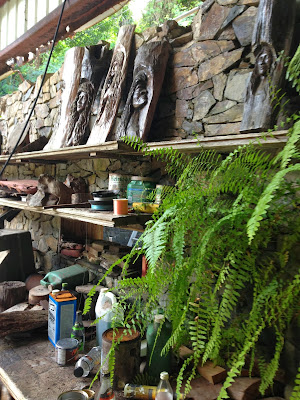Why is it that if we don't believe in
organized religion we have to be labeled with some other moniker?
Atheist, agnostic, deist, skeptic, SBNR,
non-religious etc. are terms used to describe those who don't
regularly attend a church, temple or mosque. If we don't attend these
institutions some how we are deemed less of a human being by those
that do. What gives them the right to think less of us? God? The
religious texts they follow? What?
The reason i ask this is because none
of the terms used to describe the non-religious fit what i believe and i certainly
don't consider myself less of a human. i can't find a complete
definition other than human being that comports with my failure to
follow any organized religion.
Apparently those on the religious side
say if i claim not to follow a religion but can experience awe(which i do) i will
eventually believe in the supernatural which leads to God and
religion. i tend to disagree with this.
Awe is defined as a mixed emotion of
reverence, respect, dread and wonder inspired by genius, authority,
great beauty, sublimity, or might. i experience awe and wonder
regularly in nature, in literature, through art work and music, in
the night sky or watching human beings from the very young to the
very old and yet i don't follow any organized religion nor do i
believe in the supernatural.
i do believe we are all connected and
that when our energy is released at death we go back to being part of
the universe or All One as i refer to it. But that isn't God and it
doesn't require a belief in all sorts of dogma written down by
ancient men. If it sounds spiritual it probably is but in a
non-religious context.
For a long time i thought i was a deist
someone who believed in God but not in organized religion. As i aged, studied and thought more about what the term God meant i found deist to be
unworkable. Then agnostic replaced deist and seemed to function for a while
because that is someone that thinks any ultimate reality(God) is
probably unknowable. i still believe this but agnostic no longer
works because i've done the necessary studies, asked the questions,
thought about the results and really don't think there is an all
knowing God.
Being spiritual but not religious(SBNR)
is also used to identify people like myself who are inspired by
wonder and the private aspects of awe. But again it labels us in
terms of religion and i think my real beef is that i don't want to be
labeled as anything just because i don't believe in organized
religion.
Atheist doesn't work because i believe
we will all blend into the All One when we die. Maybe some would call
this God but others would just call it a return of energy to the
cosmos. i find most of the references to God mean that what ever it
is has a direct influence on our daily existence. You can pray to it,
it will help you in times of need, it will punish you when you have
strayed, and it will ignore you completely when you think you really need it.
The All One requires nothing nor will
it punish you nor is there any dogma you must follow. We were there with the All One before we were born and we return to the All One when
we die
i am a human being, if you are reading
this so are you...and someday we will be All One.
See ya next week.
































































